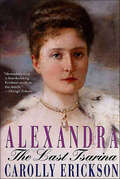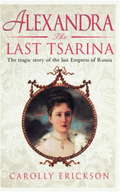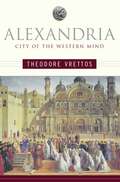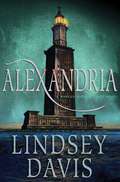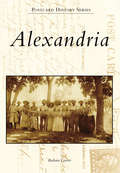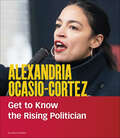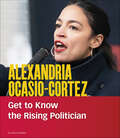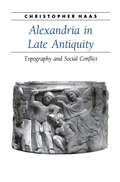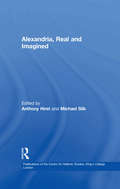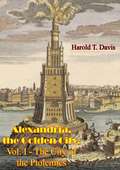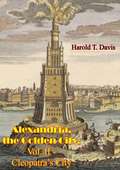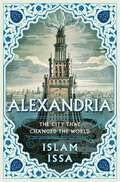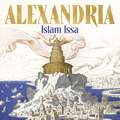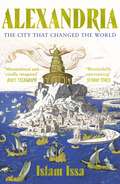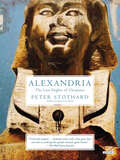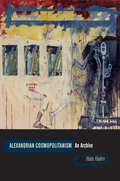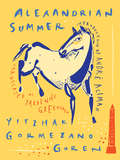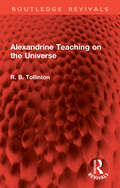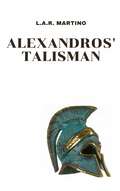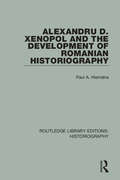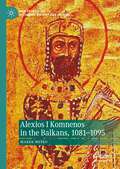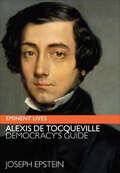- Table View
- List View
Alexandra: The Last Tsarina
by Carolly Erickson“Alexandra’s story is heartbreaking” and this New York Times–bestselling author “excels in the details” in this biography of the last Russian Empress (Chicago Tribune).Taking advantage of material unavailable until the fall of the Soviet Union, Erickson portrays Alexandra’s story as a closely observed, enthrallingly documented, progressive psychological retreat from reality.The lives of the Romanovs were full of color and drama, but the personal life of Alexandra has remained enigmatic. Under Erickson’s masterful scrutiny the full dimensions of the Empresses’ singular psychology are revealed: her childhood bereavement, her long struggle to attain her romantic goal of marriage to Nicholas, the anguish of her pathological shyness, her struggles with her in-laws, her false pregnancy, her increasing eccentricities and loss of self as she became more preoccupied with matters of faith, and her increasing dependence on a series of occult mentors, the most notorious of whom was Rasputin. With meticulous care, long practiced skill, and generous imagination, Erickson crafts a character who lives and breathes.“Entertaining. . . . One of the book’s strengths is its emphasis on the private life of the court.” —Publishers Weekly“Carrolly Erickson is one of the most accomplished and successful historical biographers writing in English.” —London Times Literary Supplement
Alexandra: The Tragic Story of the Last Empress of Russia
by Carolly EricksonThe lives and deaths of the Romanov family are redolent with colour and drama, but the personal life of the beautiful Tsarina Alexandra has remained enigmatic. Under Erickson's masterful scrutiny the full dimensions of the Empress's singular psychology are revealed: her childhood bereavement, her long struggle to attain her romantic goal of marriage to her handsome cousin Nicholas, anguishing shyness, the struggles with her in-laws, a false pregnancy, her increasing eccentricities as she became more preoccupied with matters of faith, and her growing dependence on a series of occult mentors, the most notorious of whom was Rasputin. With meticulous care, long-practised skill, and generous imagination, Erickson has brought Alexandra and her family back to life. Taking advantage of material unavailable until the fall of the Soviet Union, Erickson portrays Alexandra's story as a closely observed, enthrallingly documented, progressive psychological retreat from reality.
Alexandria
by Theodore VrettosAlexandria was the greatest cultural capital of the ancient world. Accomplished classicist and author Theodore Vrettos now tells its story for the first time in a single volume. His enchanting blend of literary and scholarly qualities makes stories that played out among architectural wonders of the ancient world come alive. His fascinating central contention that this amazing metropolis created the western mind can now take its place in cultural history. Vrettos describes how and why the brilliant minds of the ages -- Greek scholars, Roman emperors, Jewish leaders, and fathers of the Christian Church -- all traveled to the shining port city Alexander the Great founded in 332 B.C. at the mouth of the mighty Nile. There they enjoyed learning from an extraordinary population of peaceful citizens whose rich intellectual life would quietly build the science, art, faith, and even politics of western civilization. No one has previously argued that, unlike the renowned military centers of the Mediterranean such as Rome, Carthage, and Sparta, Alexandria was a city of the mind. In a brief section on the great conqueror and founder Alexander, we learn that he himself was a student of Aristotle. In Part Two of his majestic story, Vrettos shows that in the sciences the city witnessed an explosion: Aristarchus virtually invented modern astronomy; Euclid wrote the elements of geometry and founded mathematics; amazingly, Eratosthenes precisely figured the circumference of the earth; and 2,500 years before Freud, the renowned Alexandrian physician Erasistratus identified a mysterious connection between sexual problems and nervous breakdowns. What could so cerebral a community care about geopolitics? As Vrettos explains in the third part of this epic saga, if Rome wanted power and prestige in the Mediterranean, the emperors had to secure the good will of the ruling class in Alexandria. Julius Caesar brought down the Roman Republic, and then almost immediately had to go to Alexandria to secure his power base. So begins a wonderfully told story of political intrigue that doesn't end until the Battle of Actium in 33 B.C. when Augustus Caesar defeated the first power couple, Anthony and Cleopatra. The fourth part of Alexandria focuses on the sphere of religion, and for Vrettos its center is the famous Alexandrian Library. The chief librarian commissioned the Septuagint, the oldest Greek version of the Old Testament, which was completed by Jewish intellectuals. Local church fathers Clement and Origen were key players in the development of Christianity; and the Coptic religion, with its emphasis on personal knowledge of God, flourished. Vrettos has blended compelling stories with astute historical insight. Having read all the ancient sources in Ancient Greek, Hebrew, and Latin himself, he has an expert's knowledge of the everyday reality of his characters and setting. No reader will ever forget walking with him down this lost city's beautiful, dazzling streets.
Alexandria (Marcus Didius Falco #19)
by Lindsey DavisIn first century A.D. Rome, during the reign of Vespasian, Marcus Didius Falco works as a private "informer," often for the emperor, ferreting out hidden truths and bringing villains to ground. But even informers take vacations with their wives, so in A.D. 77, Falco and his wife, Helena Justina, with others in tow, travel to Alexandria, Egypt. But they aren't there long before Falco finds himself in the midst of nefarious doings--when the Librarian of the great library is found dead, under suspicious circumstances. Falco quickly finds himself on the trail of dodgy doings, malfeasance, deadly professional rivalry, more bodies and the lowest of the low--book thieves! As the bodies pile up, it's up to Falco to untangle this horrible mess and restore order to a disordered universe.
Alexandria (Postcard History Series)
by Barbara GroverAlexandria is situated near the center of Douglas County, surrounded by a chain of beautiful lakes. These lakes brought pioneer settlers to the area as early as 1858, when Minnesota achieved statehood and the town was established. The lakes remain a key factor that continue to draw residents and visitors. The images in Postcard History Series: Alexandria tell the community's story, recalling fond memories of the businesses, churches, homes, schools, and recreational opportunities that form the generous and caring nature of the welcoming community that is Alexandria.
Alexandria Ocasio-Cortez: Get to Know the Rising Politician (People You Should Know)
by Leticia GonzalesAlexandria Ocasio-Cortez, often known as AOC, wrote her name in the history books in 2018 when she became the youngest woman ever elected to the U.S. Congress. Her fearless, meteoric rise from paycheck-to-paycheck to the House of Representatives and her tireless advocacy for a world inclusive of all peoples will fascinate readers.
Alexandria Ocasio-Cortez: Get to Know the Rising Politician (People You Should Know)
by Leticia GonzalesAlexandria Ocasio-Cortez, often known as AOC, wrote her name in the history books in 2018 when she became the youngest woman ever elected to the U.S. Congress. Her fearless, meteoric rise from paycheck-to-paycheck to the House of Representatives and her tireless advocacy for a world inclusive of all peoples will fascinate readers.
Alexandria Ocasio-Cortez: Get to Know the Rising Politician (People You Should Know)
by Leticia SnowAlexandria Ocasio-Cortez, often known as AOC, wrote her name in the history books in 2018 when she became the youngest woman ever elected to the U.S. Congress. Her fearless, meteoric rise from paycheck-to-paycheck to the House of Representatives and her tireless advocacy for a world inclusive of all peoples will fascinate readers.
Alexandria in Late Antiquity: Topography and Social Conflict (Ancient Society and History)
by Christopher Haas“A valuable and much needed contribution to the study of Alexandria and late antiquity” which presents “a vivid and interesting portrait” (Classical Review).A Choice Magazine Outstanding Academic TitleSecond only to Rome in the ancient world, Alexandria was home to many of late antiquity’s most brilliant writers, philosophers, and theologians—among them Philo, Origen, Arius, Athanasius, Hypatia, Cyril, and John Philoponus. Now, in Alexandria in Late Antiquity, Christopher Haas places these figures within the physical and social context of Alexandria’s bustling urban milieu.Haas explores the broad avenues and back alleys of Alexandria’s neighborhoods, its suburbs and waterfront, and aspects of material culture that underlay Alexandrian social and intellectual life. Moving between the city’s Jewish, pagan, and Christian blocs, he details the fiercely competitive nature of Alexandrian social dynamics. In contrast to the notion that Alexandria’s diverse communities coexisted peaceably, Haas finds that struggles for social dominance and cultural hegemony often resulted in violence and bloodshed.Haas concludes that Alexandrian society achieved a certain stability and reintegration—a process that resulted in the transformation of Alexandrian civic identity during the crucial centuries between antiquity and the Middle Ages.
Alexandria in Late Antiquity: Topography and Social Conflict (Ancient Society and History)
by Christopher HaasHaas explores the broad avenues and back alleys of Alexandria's neighborhoods, its suburbs and waterfront, and aspects of material culture that underlay Alexandrian social and intellectual life.Selected by Choice Magazine as an Outstanding Academic TitleSecond only to Rome in the ancient world, Alexandria was home to many of late antiquity's most brilliant writers, philosophers, and theologians—among them Philo, Origen, Arius, Athanasius, Hypatia, Cyril, and John Philoponus. Now, in Alexandria in Late Antiquity, Christopher Haas offers the first book to place these figures within the physical and social context of Alexandria's bustling urban milieu. Because of its clear demarcation of communal boundaries, Alexandria provides the modern historian with an ideal opportunity to probe the multicultural makeup of an ancient urban unit. Haas explores the broad avenues and back alleys of Alexandria's neighborhoods, its suburbs and waterfront, and aspects of material culture that underlay Alexandrian social and intellectual life. Organizing his discussion around the city's religious and ethnic blocs—Jews, pagans, and Christians—he details the fiercely competitive nature of Alexandrian social dynamics. In contrast to recent scholarship, which cites Alexandria as a model for peaceful coexistence within a culturally diverse community, Haas finds that the diverse groups' struggles for social dominance and cultural hegemony often resulted in violence and bloodshed—a volatile situation frequently exacerbated by imperial intervention on one side or the other.Eventually, Haas concludes, Alexandrian society achieved a certain stability and reintegration—a process that resulted in the transformation of Alexandrian civic identity during the crucial centuries between antiquity and the Middle Ages.
Alexandria, Real and Imagined (Publications of the Centre for Hellenic Studies, King's College London #5)
by Michael Silk Anthony HirstAlexandria, Real and Imagined offers a complex portrait of an extraordinary city, from its foundation in the fourth century BC up to the present day: a city notable for its history of ethnic diversity, for the legacies of its past imperial grandeur - Ottoman and Arab, Byzantine, Roman and Greek - and, not least, for the memorable images of 'Alexandria' constructed both by outsiders and by inhabitants of the city. In this volume of new essays, Alexandria and its many images - the real and the imagined - are illuminated from a rich variety of perspectives. These range from art history to epidemiology, from social and cultural analysis to re-readings of Cavafy and Callimachus, from the impressions of foreign visitors to the evidence of police records, from the constructions of Alexandria in Durrell and Forster to those in the twentieth-century Arabic novel.
Alexandria, the Golden City, Vol. I - The City of the Ptolemies (Alexandria, the Golden City #1)
by Harold T. DavisOriginally published in two volumes in 1957, this is the first volume devoted to the rich history of the ancient Egyptian city of Alexandria and focuses on the time of the Ptolemies."This book is dedicated to the story of Alexandria, called by Athenaeus "the golden city." The story of Athens has been told by many writers; the rise and fall of Home has been the favorite theme of the historians; but the city of Alexandria has never had an extensive biography. This is a curious fact, indeed, since Alexandria, founded in 332 B.C. by Alexander the Great, developed into regal magnificence under the Macedonian Ptolemies, and for nearly a thousand years was one of the most remarkable cities in the world. The infirmities of old age came upon it near the close of the Roman Empire and the weary city finally passed into oblivion about 646 A.D. when the Saracen invaders destroyed at last the monuments of its old-world glory. Thus stretches the biography of Alexandria across ten of the most interesting centuries in human history!"Richly illustrated throughout with maps, pictures and figures.
Alexandria, the Golden City, Vol. II - Cleopatra’s City (Alexandria, the Golden City #2)
by Harold T. DavisOriginally published in two volumes in 1957, this is the second volume devoted to the rich history of the ancient Egyptian city of Alexandria and focuses on the time of Cleopatra, Queen of Egypt, "whose magic enthralled two of the most eminent Romans of their times and brought one of them to ruin.""[For] one will find in the chronicles of Alexandria every form of human passion. He will see a procession of kings both good and evil. He will become acquainted with emperors of lofty vision and with others whose degradation of mind and action surpasses belief. He will view periods in which human happiness reaches one of its higher points, when the arts and sciences flourish in a golden age. He will witness the rapid change to eras of tumult and civil war when storms of incredible human brutality sweep across the scene. And through these changing patterns of human happiness and human woe he may be able to understand more easily the reasons why the world is so often shaken by evil forces. And he may also derive the hope that these storms like others finally pass away and more benevolent periods emerge at last from the rack and ruin of the past."Richly illustrated throughout with maps, pictures and figures.
Alexandria: The City that Changed the World
by Islam IssaAn original, authoritative, and lively cultural history of the first modern city, from pre-Homeric times to the present day.Islam Issa&’s father had always told him about their city's magnificence, and as he looked at the new library in Alexandria it finally hit home. This is no ordinary library. And Alexandria is no ordinary city. Combining rigorous research with myth and folklore, Alexandria is an authoritative history of a city that has shaped our modern world. Soon after being founded by Alexander the Great, Alexandria became the crucible of cultural exchange between East and West for millennia and the undisputed global capital of knowledge. It was at the forefront of human progress, but it also witnessed brutal natural disasters, plagues, crusades and violence. Major empires fought over Alexandria, from the Greeks and Romans to the Arabs, Ottomans, French, and British. Key figures shaped the city from its eponymous founder to Aristotle, Cleopatra, Saint Mark the Evangelist, Napoleon Bonaparte and many others, each putting their own stamp on its identity and its fortunes. And millions of people have lived in this bustling seaport on the Mediterranean. From its humble origins to its dizzy heights and its latest incarnation, Islam Issa tells us the rich and gripping story of a city that changed the world.
Alexandria: The City that Changed the World: 'Monumental' – Daily Telegraph
by Islam IssaAn original, authoritative and lively cultural history of the first modern city, from pre-Homeric times to the present day.My dad had always told me about our city's magnificence, and as I looked at the new library in Alexandria it finally hit home. This is no ordinary library, I reflected. And this is no ordinary city. Combining rigorous research with myth and folklore, Alexandria is an authoritative history of a city that has shaped our modern world. Soon after being founded by Alexander the Great, Alexandria became the crucible of cultural exchange between East and West for millennia and the undisputed global capital of knowledge. It was at the forefront of human progress, but it also witnessed brutal natural disasters, plagues, crusades and violence. Major empires fought over Alexandria, from the Greeks and Romans to the Arabs, Ottomans, French and British. Key figures shaped the city from its eponymous founder to Aristotle, Cleopatra, Saint Mark the Evangelist, Napoleon Bonaparte and many others, each putting their own stamp on its identity and its fortunes. And millions of people have lived in this bustling seaport on the Mediterranean. From its humble origins to its dizzy heights and its latest incarnation, Islam Issa tells us the rich and gripping story of a city that changed the world.(P)2023 Hodder & Stoughton Limited
Alexandria: The City that Changed the World: 'Monumental' – Daily Telegraph
by Islam IssaA SUNDAY TIMES AND TLS BOOK OF THE YEAR'Fascinating and important'Natalie Haynes, author of Stone Blind'Monumental and vividly imagined'Daily Telegraph'Wonderfully entertaining'Sunday Times'Lively and engrossing 'Literary ReviewOn a sparsely populated Egyptian coastline, Alexander the Great sketched his vision of a metropolis into the sand. Situated on the cusp of three continents, it became the city where Greeks and Egyptians, Romans and Jews created a global knowledge capital that changed the face of philosophy, religion and science forever. In this sweeping biography of the great city, Islam Issa takes us on a fascinating journey across millennia. Rich in big ideas, brutal tragedies and distinctive characters, Alexandria tells the gripping story of a city that has shaped our modern world.'A multifaceted history of an enthralling city'Lloyd Llewellyn-Jones, author of Persians: The Age of the Great Kings'A cornucopia of fascinating details, every page revealing a new delight'Paul Strathern, author of The Medici
Alexandria: The City that Changed the World: 'Monumental' – Daily Telegraph
by Islam IssaA SUNDAY TIMES AND TLS BOOK OF THE YEAR'Fascinating and important'Natalie Haynes, author of Stone Blind'Monumental and vividly imagined'Daily Telegraph'Wonderfully entertaining'Sunday Times'Lively and engrossing 'Literary ReviewOn a sparsely populated Egyptian coastline, Alexander the Great sketched his vision of a metropolis into the sand. Situated on the cusp of three continents, it became the city where Greeks and Egyptians, Romans and Jews created a global knowledge capital that changed the face of philosophy, religion and science forever. In this sweeping biography of the great city, Islam Issa takes us on a fascinating journey across millennia. Rich in big ideas, brutal tragedies and distinctive characters, Alexandria tells the gripping story of a city that has shaped our modern world.'A multifaceted history of an enthralling city'Lloyd Llewellyn-Jones, author of Persians: The Age of the Great Kings'A cornucopia of fascinating details, every page revealing a new delight'Paul Strathern, author of The Medici
Alexandria: The Last Nights of Cleopatra
by Peter StothardA blend of memoir, history, and travelogue exploring the ancient Egyptian city on the eve of the Arab Spring: “Fresh and original . . . quietly virtuosic.” —The Wall Street JournalBlending aspects of memoir, history, and travel narrative into an elegant and unique tapestry, Peter Stothard uses the sights and sounds of the ancient city to reconnect with the experiences that shaped him and sparked a passionate interest in the life of Cleopatra. Melancholy, yet often humorous, Alexandria probingly deconstructs the enigma of modern Egypt—with its uneasy mix of classical touchstones and increasingly volatile Middle Eastern politics—and offers a firsthand glimpse into the fracturing state just before the Tahrir Square uprising and the start of the Arab Spring.Includes photographs“A thoroughly enjoyable combination of history, autobiography, travel and general musings about Alexandria . . . Don’t try to categorize this book; just read it and let it flow over you.” —Kirkus Reviews (starred review)“A chance trip to Alexandria and a lifelong love affair with Cleopatra coalesce . . . Staying in Alexandria’s Metropole Hotel and guided through the city by the at turns effusive and secretive Socratis and Mahmoud, Stothard relates not only his encounters with the remnants of Cleopatra throughout Alexandria but also the origins of his fascination with the Egyptian queen.” —Publishers Weekly
Alexandrian Cosmopolitanism: An Archive
by Hala HalimInterrogating how Alexandria became enshrined as the exemplary cosmopolitan space in the Middle East, this book mounts a radical critique of Eurocentric conceptions of cosmopolitanism. The dominant account of Alexandrian cosmopolitanism elevates things European in the city’s culture and simultaneously places things Egyptian under the sign of decline. The book goes beyond this civilization/barbarism binary to trace other modes of intercultural solidarity.Halim presents a comparative study of literary representations, addressing poetry, fiction, guidebooks, and operettas, among other genres. She reappraises three writers—C. P. Cavafy, E. M. Forster, and Lawrence Durrell—who she maintains have been cast as the canon of Alexandria. Attending to issues of genre, gender, ethnicity, and class, she refutes the view that these writers’ representations are largely congruent and uncovers a variety of positions ranging from Orientalist to anticolonial. The book then turns to Bernard de Zogheb, a virtually unpublished writer, and elicits his camp parodies of elite Levantine mores in operettas, one of which centers on Cavafy. Drawing on Arabic critical and historical texts, as well as contemporary writers’ and filmmakers’ engagement with the canonical triumvirate, Halim orchestrates an Egyptian dialogue with theEuropean representations.
Alexandrian Summer
by Yitzhak Gormezano Goren&“A powerful novel of tensions—sexual, familial, religious, and political . . . Alexandria—sensual and enchanting—shimmers in these pages&” (Dalia Sofer, national-bestselling author of The Septembers of Shiraz). Alexandrian Summer is the story of two Jewish families living their frenzied last days in the doomed cosmopolitan social whirl of Alexandria just before fleeing Egypt for Israel in 1951. The conventions of the Egyptian upper-middle class are laid bare in this dazzling novel, which exposes startling sexual hypocrisies and portrays a now vanished polyglot world of horse-racing, seaside promenades, and elegant nightclubs. Hamdi-Ali senior is an old-time patriarch with more than a dash of strong Turkish blood. His handsome elder son, a promising horse jockey, can&’t afford sexual frustration, as it leads him to overeat and imperil his career, but the woman he lusts after won&’t let him get beyond undoing a few buttons. Victor, the younger son, takes his pleasure with other boys. But the true heroine of the story—richly evoked in a pungent upstairs/downstairs mix—is the raucous, seductive city of Alexandria itself. &“Helps show why postwar Alexandria inspires nostalgia and avidity in seemingly everyone who knew it . . . The result is what summer reading should be: fast, carefree, visceral, and incipiently lubricious.&” —The New Yorker &“Luminous . . . One of the great triumphs of Alexandrian Summer is the richness of the evocation of this city and the multiple cultures pressed within it . . . A sultry eroticism pervades.&” —The Forward &“Gormezano Goren&’s characters are vividly depicted as they grow up or grow older in a city of conflicting loyalties, riven by resentment, ready to revolt. Readers will be transported.&” —Publishers Weekly &“A profound literary experience.&” —Ahshav
Alexandrine Teaching on the Universe (Routledge Revivals)
by R. B. TollintonOriginally published in 1932, this book is based on a series of lectures delivered in Cambridge in 1931. The views of the universe as held by the great teachers of Ancient Alexandria are discussed: Philo, Clement, Origen, Plotinus and the Gnostics are considered and their outlook compared and contrasted with certain phases of early 20th Century scientific opinion..
Alexandros' Talisman
by L.A.R. MartinoThe young researcher Lucía Farré, a specialist in molecular biology, has just lost the scholarship for her scientific project and the fidelity of her partner on the same day. As she tries to rebuild her life, strange events begin to occur around her. Without knowing it, she is immersed in the most important and long-standing conspiracy in history, that of a sect that has been controlling the destiny of humanity for centuries with the help of an ancient relic, a mysterious talisman that belonged to Alexander the Great. But why are they chasing her? What role does Lucía play in this ancient plot?
Alexandru D. Xenopol and the Development of Romanian Historiography (Routledge Library Editions: Historiography #33)
by Paul A. HiemstraDespite the criticism of his peers and the inattention of his successors, Alexandru Xenopol provided Romanian nationalistic historiography with a greater measure of respectability, especially with the general public. By the time of WWI a strong sense of national identity had become entrenched as an intellectually respectable mentality among Romania’s literate classes. This book examines Xenopol’s participation in the creation of this mentality in Romania during decades that were crucial to the development of institutionalized intellectual life and and educted behaviour in that country.
Alexios I Komnenos in the Balkans, 1081–1095 (New Approaches to Byzantine History and Culture)
by Marek MeškoThis book provides a new military history of Byzantine emperor Alexios I Komnenos's campaigns in the Balkans, during the first fourteen years of his rule. While the tactics and manoeuvres Alexios used against Robert Guiscard's Normans are relatively well-known, his strategy in dealing with Pecheneg and Cuman adversaries in the region has received less attention in historical scholarship. This book provides a much-need synthesis of these three closely linked campaigns – often treated as discrete events – revealing a surprising coherence in Alexios' response, and explores the position of Byzantium's army and navy on the eve of the First Crusade.
Alexis de Tocqueville: Democracy's Guide (Eminent Lives)
by Joseph EpsteinAlexis de Tocqueville was among the first foreigners to recognize the potential of a new land called the United States. His classic work Democracy in America, first published in 1835, was not only a vivid portrait of the new nation, but also a startlingly accurate forecast of its future. From the influence of evangelical Christianity to the advent of our “consumer society,” many of de Tocqueville’s predictions have come true. Bestselling author Joseph Epstein revisits de Tocqueville’s legacy, providing a fresh account of his classic travels in America. Epstein explains how de Tocqueville, introverted and prone to self-doubt, arrived at such a profoundly influential interpretation of this new country and its government. Alexis de Tocqueville: Democracy’s Guide is a compelling portrait of the Frenchman who would become an American icon. Joseph Epstein is the author of, among other books, Snobbery: The American Version, Fabulous Small Jews (a collection of stories), Envy, and Friendship: An Exposé. He was the editor of The American Scholar between 1974 and 1997, and for many years taught in the English Department at Northwestern University. His essays and stories have appeared in the New Yorker, Commentary, the Atlantic Monthly, and other magazines.
